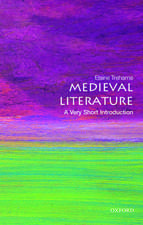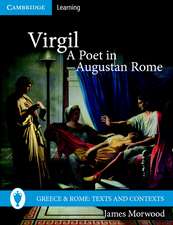Europe: Volume 2: A Literary History, 1348-1418
Editat de David Wallaceen Limba Engleză Hardback – 14 apr 2016
| Toate formatele și edițiile | Preț | Express |
|---|---|---|
| Paperback (2) | 345.78 lei 11-16 zile | |
| OUP OXFORD – 21 ian 2021 | 345.78 lei 11-16 zile | |
| OUP OXFORD – 21 ian 2021 | 349.03 lei 11-16 zile | |
| Hardback (2) | 959.85 lei 6-8 săpt. | |
| OUP OXFORD – 14 apr 2016 | 959.85 lei 6-8 săpt. | |
| OUP OXFORD – 14 apr 2016 | 1410.81 lei 6-8 săpt. | |
| Quantity pack (1) | 506.12 lei 11-16 zile | |
| OUP OXFORD – 21 ian 2021 | 506.12 lei 11-16 zile |
Preț: 959.85 lei
Preț vechi: 1246.56 lei
-23% Nou
Puncte Express: 1440
Preț estimativ în valută:
183.67€ • 191.39$ • 152.08£
183.67€ • 191.39$ • 152.08£
Carte tipărită la comandă
Livrare economică 03-17 aprilie
Preluare comenzi: 021 569.72.76
Specificații
ISBN-13: 9780199580026
ISBN-10: 0199580022
Pagini: 888
Ilustrații: 93 black-and-white halftones
Dimensiuni: 187 x 251 x 50 mm
Greutate: 2 kg
Editura: OUP OXFORD
Colecția OUP Oxford
Locul publicării:Oxford, United Kingdom
ISBN-10: 0199580022
Pagini: 888
Ilustrații: 93 black-and-white halftones
Dimensiuni: 187 x 251 x 50 mm
Greutate: 2 kg
Editura: OUP OXFORD
Colecția OUP Oxford
Locul publicării:Oxford, United Kingdom
Recenzii
This project is a major achievement, one that will be of tremendous use to scholars in the area. It succeeds in responding to the contemporary challenges to the identity of Europe as a political entity, seen most dramatically perhaps in the turmoil over the Brexit vote... It is particularly valuable for bringing out cultural differences in areas usually treated as being essentially homogeneous, and, conversely, in emphasising the power of lines of economic and literary exchange in binding together points of production not usually associated with each other.
These modern examples, again instances of literary production and response that have to be read in terms of places and layerings, illustrate the key aspect that the book so wonderfully brings to our attention: literature is produced in places that are saturated with text, character, and experience; and these texts migrate, get archived, become parts of libraries and collections, and generate readers and texts in these very places, welcoming itinerant materials and engaging with them. What happens to the reader who dwells in this richness is both a defamiliarization, with regard to established temporal and topographical patterns, and a newfamiliarity with the landscapes and the configurations that make literatures and literary imagination emerge.
These modern examples, again instances of literary production and response that have to be read in terms of places and layerings, illustrate the key aspect that the book so wonderfully brings to our attention: literature is produced in places that are saturated with text, character, and experience; and these texts migrate, get archived, become parts of libraries and collections, and generate readers and texts in these very places, welcoming itinerant materials and engaging with them. What happens to the reader who dwells in this richness is both a defamiliarization, with regard to established temporal and topographical patterns, and a newfamiliarity with the landscapes and the configurations that make literatures and literary imagination emerge.
Notă biografică
David Wallace, who studied at York (BA), Perugia, and Cambridge (Ph.D.), has been Judith Rodin Professor of English, University of Pennsylvania, since 1996, with visiting positions at Jerusalem, London, Leipzig, Melbourne, and Princeton. He has travelled and lectured widely across Europe, and also north America, Australia, and Japan, and has made a series of radio documentaries for the BBC. He is the author or editor of ten books, including Premodern Places and The Cambridge History of Medieval English Literature.
















